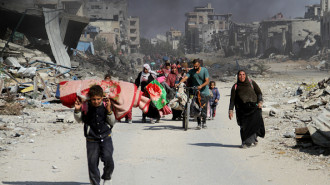Tunisia condemns 8 to death for presidential guard attack
Eight people were sentenced to death in a trial for a 2015 attack on a Tunisian presidential guard bus that killed 12.
The November 24, 2015 suicide bombing in the capital Tunis claimed by the Islamic State group (IS) killed a dozen presidential guards and wounded 20 more.
"The court issued the death sentence against eight people accused of participating in the attack against the presidential guards' bus," deputy public prosecutor Mohsen Dali told AFP on Saturday.
Two others were sentenced to 10 years and life imprisonment respectively, he said.
The convicted were all found guilty of "voluntary murder and belonging to terrorist groups," Dali said, without providing details about their identities.
Read also: No 'power vacuum' in Tunisia despite president's death rumours
Only four of those convicted appeared in person at the trial, with the rest sentenced in absentia.
Tunisia has imposed a moratorium on carrying out capital punishment since 1991.
IS claimed two other major attacks in Tunisia in 2015.
An attack at the capital's Bardo museum that March killed 21 foreign tourists and a security guard. In June 2015, 38 foreign tourists were killed in a shooting rampage at the coastal resort of Sousse.
In February 2019, a Tunisian court sentenced seven to life imprisonment for the attacks on Bardo and Sousse.
Tunisia faced a rise in jihadist activity after its 2011 revolution, with attacks killing dozens of security personnel, civilians and foreign tourists.
Twitter Post
|
While the security situation has significantly improved following increased security around popular destinations and the lifting of negative travel advice, Tunisia has maintained a state of emergency for the last four years.
Last month, British low-budget airline Easyjet announced plans to return to Tunisia for the first time since cancelling services to the North African country after the Sousse terror attack in 2015 that killed British holidaymakers.
The airline will run two flights a week between London's Gatwick Airport and the beach resort of Enfidha starting in May 2020.
British airlines stopped flights to Tunisia after the UK's Foreign Office advised against all but essential to Tunisia in the aftermath of the 2015 attack, in which 31 British nationals were killed.
Major European tour operators start to return to Tunisia in 2018 with tourist numbers beginning to return to pre-crisis levels, according to the country's tourism minister. The number of foreign visitors rose close to 45 percent last year.
Tourism accounts for around eight percent of Tunisia's gross domestic product so the return of European visitors would help boost the sluggish economy and raise the country's weak foreign currency reserves.
Revenues from tourism bounced to $1.36 billion in 2018 and Tunisia expects tourist arrivals to reach a record nine million in 2019, based on governmental calculations.
Tunisians made up a large component of the foreign fighters in IS, while the porous border with neighbouring Libya has also aided militants.

![Palestinians mourned the victims of an Israeli strike on Deir al-Balah [Getty]](/sites/default/files/styles/image_684x385/public/2024-11/GettyImages-2182362043.jpg?h=199d8c1f&itok=xSHZFbmc)


![The law could be enforced against teachers without prior notice [Getty]](/sites/default/files/styles/image_684x385/public/2178740715.jpeg?h=a5f2f23a&itok=hnqrCS4x)
 Follow the Middle East's top stories in English at The New Arab on Google News
Follow the Middle East's top stories in English at The New Arab on Google News


![Voters in Michigan [Getty]](/sites/default/files/styles/image_330x185/public/2182490468.jpeg?h=a5f2f23a&itok=XMi_sWGX)